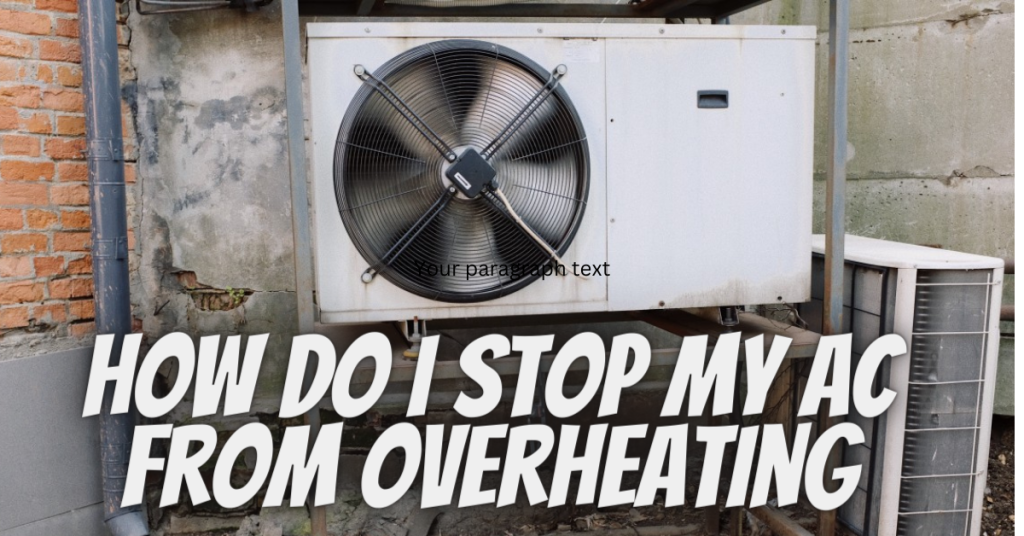How do I stop my AC from overheating?
It’s been a long, hot day, and you can’t wait to go home and relax in your air-conditioned living room. When you open your front door, though, you discover that the inside of your home is hotter and stickier than the outside. Your air conditioner most likely overheated and tripped the circuit breaker, allowing your home to swelter in the summer heat. So, what can you do to protect and Stop AC from Overheating? Follow these five pointers for assistance.
The amount of time you use your air conditioner is increasing as the temperature rises. Your air conditioner is in danger of overheating during the warm months. But don’t be concerned! Here AC Repair Dubai provides some terrific suggestions for keeping your air conditioner in good working order so it doesn’t overheat.
Perform routine maintenance and upkeep
One of the most essential things you can do to keep Stop AC from Overheating is to keep your HVAC system in good working order.
Your air conditioner is made up of two parts: an interior unit and an outer unit. The interior unit uses refrigerant to blast air and remove heat. To cool, the heated refrigerant is sent to the external unit. However, if your exterior coils become dusty, heat does not escape and your unit must work harder to cool the air, eventually overheating.
Maintain the cleanliness of the condenser coils:
The condenser coil is positioned in the exterior unit and is responsible for removing heat from your house. It is important that the condenser coil can carry out this duty to Stop AC from Overheating.
When the coil is unclean, it acts as an insulator, trapping heat within. Meanwhile, your air conditioner will work overtime to meet the low-temperature setting on your thermostat. It’s a vicious cycle that will eventually overheat your system.
Regularly replace your air filters:
Keeping your air conditioner from overheating boils down to making sure it isn’t working too hard. When your filters become clogged, the airflow to the whole system might become obstructed.
A filthy air filter will eventually cause the air conditioner to overheat and trip the circuit breaker. Worst-case scenario: A clogged filter might cause the air conditioner to malfunction.
In addition to standard maintenance and servicing, you should clean and change your air filters every 90 days or three months for optimal performance. Keep a supply of filters on hand, or contact AC Maintenance air conditioning provider to see whether a washable filter can be used.
Don’t Ignore Your Ductwork:
However, keeping your filters clean is just half the battle. You should also make certain that your ductwork is clean and clear. However, because your filters protect your ductwork, you won’t have to worry about examining and clearing your ducts as frequently as you do about the filters.
In fact, ductwork inspection and cleaning are frequently included in your yearly HVAC maintenance. The key is to have your ducts checked and cleaned at least once a year, and more frequently if you notice that your system is having difficulty keeping the house cool or that it is running constantly to maintain the proper temperature.
Don’t overwork your air conditioning system:
Your house’s air conditioner has a difficult job, and even the greatest and most well-maintained systems might struggle to keep your entire home at a comfortable 72 degrees on the warmest and most humid summer days. So, to keep your system from overheating, take breaks whenever available. Adjust your thermostat a few degrees higher, and supplement with ceiling fans, energy-efficient blinds, and draperies that can be closed on hot days to optimize the cooling impact of your AC unit and fans.
Keep an eye on your refrigerant and lubricant levels:
To perform properly and without overheating, your air conditioner needs more than just clean air filters and ducts. The operation of your air conditioning system is especially dependent on the refrigerant. An air conditioning machine might leak refrigerant, and not enough or low refrigerant can compel your AC unit to operate continuously, causing it to overheat. If your house is not cooling rapidly and your unit is running constantly, it may be short on refrigerant.
If you have a refrigerant leak, you should leave it to the AC Repair Service pros for repair. In order to make the necessary repairs, an HVAC repair technician must confirm the leak and drain all of the present refrigerants.
Brush the Fan Blades
Your system’s fan blades are designed to be as efficient as possible. Excess dust and debris will add weight, making it difficult for the blades to move. The engine will be compelled to work overtime for many hours every day, eventually leading to a burn-out. Any issues should be avoided by simply cleaning the fan’s blades and so Stop AC from Overheating.
Summary:
Your unit will have to work a little harder than normal throughout the summer. Of course, air conditioners are designed to perform in hot weather, but a system that has seen years of faithful service may be subject to overheating.
If you haven’t been keeping up with maintenance, your system may be showing signs of wear and tear that it shouldn’t at its age. A unit that is out of shape would naturally struggle to adapt to the high criteria for which it was initially rated.
In addition to making sure your system is primed with refrigerant, make sure all of your system’s moving parts are well-lubricated. In most circumstances, a professional will do this step as part of your yearly inspection and service. However, if you have an older AC system or hear screaming or grinding sounds, it’s an indication that your system needs to be oiled.

